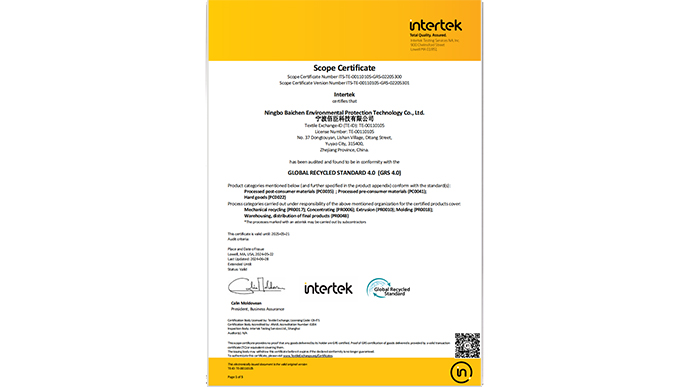Observation on the Dynamics of the Recycled Plastic and New Energy Fields in Multiple Countries
Views: 785
Author: Site Editor
Publish Time: 2024-09-10
Origin: Site


《Observation on the Dynamics of the Recycled Plastic and New Energy Fields in Multiple Countries》
In the current era of the joint development of the global economy and environmental protection concepts, countries are constantly introducing new developments in the fields of recycled plastic and new energy.
On September 6, Reuters reported that Japan has decided to provide more subsidies for the production of electric vehicle batteries domestically. Among them, a huge subsidy of up to 2.4 billion U.S. dollars (about 17 billion yuan) is given to Toyota's related projects, aiming to support Toyota in strengthening its battery supply chain. Japan's Minister of Economy, Trade and Industry clearly stated that the government will fully support 12 battery projects and their parts, materials, or production equipment projects. Japanese media have reported that this measure is expected to significantly increase the country's annual battery production capacity from the current 80GWh by about 50% to 120GWh. This fully shows Japan's high attention to the electric vehicle battery industry and its determination to actively layout and seize the market in the new energy field.
According to Yonhap News Agency on September 9, the South Korean Ministry of Transport plans to issue legislative notices for the new government regulations on electric vehicle safety announced last week. The legislative announcement of the amendment to the implementation regulations of the "Automobile Management Law" will last from Tuesday to October 21 for 40 days. The South Korean government announced last week that the electric vehicle battery certification system originally scheduled to be implemented in February next year will be piloted in advance in October this year. In addition, enterprises are also required to disclose key information about batteries, including brands and main components. South Korea's active actions in the field of electric vehicle safety supervision reflect its high attention to the healthy development of the new energy vehicle industry. By strengthening the certification system and information disclosure, it enhances the standardization and safety of the industry.
In the field of recycled plastics, Thailand also has outstanding performance. Thailand's SCG Chemical (SCGC) and Kao Industries (Thailand) Co., Ltd. jointly launched recycled plastic packaging for Feather hair care products. This packaging is produced using high-quality rHDPE resin of the SCGC GREEN POLYMER brand and is claimed to come from SCGC's advanced recycling technology. This packaging not only reduces carbon emissions but is also completely recyclable. The sustainable Feather shampoo bottle has no added pigments, and the label has a tearable perforated strip for easy removal, bringing great convenience for recycling. SCGC claims to have launched Asia's first advanced recycling demonstration project in January 2021, and its factory obtained ISCC Plus certification in September of the same year. Thailand's active exploration in the field of recycled plastics provides a useful reference for the global environmental protection cause and shows the broad application prospects of recycled plastics in the field of consumer product packaging.
Recently, Dow announced the launch of its first bio-circular product for the flooring industry, as a supplement to the ENGAGE™ REN polyolefin elastomer (POE) product portfolio. This new bio-circular POE product will be used to manufacture carpet tile backings, providing dimensional stability and adhesion to fibers. Dow's innovative move further expands the application of bio-circular products in different industries and injects new vitality into sustainable development.
To sum up, the active actions of various countries in the fields of recycled plastics and new energy reflect the global high attention to environmental protection and sustainable development. In the new energy field, Japan and South Korea promote the development of the electric vehicle battery industry through measures such as subsidies and strengthened supervision, laying a solid foundation for reducing carbon emissions and realizing energy transformation. In the field of recycled plastics, the innovative practices of Thailand and Dow provide feasible solutions for reducing plastic pollution and realizing resource recycling. In the future, with the continuous attention and investment of various countries in environmental protection and sustainable development, the fields of recycled plastics and new energy will surely usher in a broader development space.

